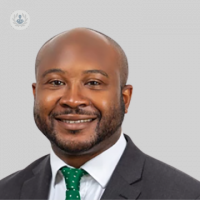What is a vasectomy, and how effective is it?
Written in association with:Here, in this article below, highly regarded consultant urologist, Mr Nkwam Michael Nkwam, talks about vasectomy in expert detail, including how it is performed.

What is a vasectomy?
A vasectomy is a specific procedure for male sterilisation. It involves the cutting or the sealing of the tubes that carry a man’s sperm to prevent male fertility. It is a permanent form of contraception.
How does vasectomy work?
During a vasectomy, the tubes that carry male sperm from the testicles to the urethra are either cut or sealed. This prevents sperm from getting to the semen, which is ejaculated during sexual activity.
Without sperm in the semen, fertilisation cannot occur. This leads to permanent contraception. It is typically done in an outpatient setting under local anaesthetic, and is deemed the most highly effective method of birth control.
How effective is vasectomy?
It is a highly efficient and reliable method of birth control. It is considered to be one of the most reliable options for permanent sterilisation. The failure rate is very low (usually less than 0.5 per cent). However, it is important to follow up the recommended post-vasectomy semen analysis to confirm the absence of sperm.
What are the risks and complications of vasectomy?
The main risks include bleeding, swelling, infection, and very rarely, chronic pain.
What is the recovery period for vasectomy?
The recovery period is relatively short. Most men can resume light activities a day or two after the procedure. Pain and swelling are common in the first few days after a vasectomy.
A return to sexual activity can occur after about a week or two after the procedure, but patients should ensure to follow any specific post-operative advice given to them.
If you wish to schedule an appointment with Mr Nkwam Michael Nkwam, visit his Top Doctors profile today.


